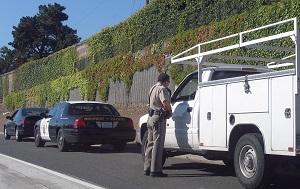This article was produced in collaboration with AlterNet and first appeared here.

The Rodriguez in question was Elivette Rodriguez, who was a passenger in a car stopped by New Bedford police in 2012 after they allegedly detected the smell of marijuana coming from the vehicle. During the stop, police found a bag containing 60 Percocet pills, and Rodriguez was charged with possession of a Class B substance with intent to distribute, as well as other offenses.
Before trial, Rodriguez filed a motion to suppress the evidence from the search, arguing that since the state had decriminalized the possession of small amounts of marijuana in 2008, the mere odor of marijuana coming from the car did not create sufficient probable cause to undertake the traffic stop and subsequent search. The trial judge denied that motion, but put the trial on hold while Rodriguez appealed his decision. The Supreme Judicial Court on its own initiative took the case from the appeals court.
In its ruling Tuesday, leaning heavily on the 2008 decriminalization law, the Supreme Judicial Court agreed with Rodriguez. "Permitting police to stop a vehicle based on reasonable suspicion that an occupant possesses marijuana does not serve [the] objectives" of the law, Justice Margot Botsford wrote for the majority. Allowing such stops "does not refocus police efforts on pursing more serious crime," another goal of the law, she wrote.
The court's 5-2 majority ruled that the pills were inadmissible in court because they were "fruit of the poisoned tree," in the classic formulation. In other words, the evidence resulted from an illegal search and thus must be thrown out. Rodriguez' drug case was referred back to district court for "further proceedings consistent with this opinion," but since they now have no evidence against her, prosecutors said they would drop the case.
In arguing the case, Bristol prosecutors had asserted that police can stop vehicles for a civil marijuana offense, just as they can for a civil traffic offense, but the court rejected that argument. While traffic laws are designed to promote road safety, "there is no obvious and direct link" between marijuana possession and maintaining highway safety.
"The high court was making a statement "about how the police ought to spend their time and the taxpayers' money," ACLU of Massachusetts legal director Matthew Segal told the Boston Globe. Pulling over a vehicle for suspicion of marijuana possession "is not consistent with the Massachusetts constitution, nor is it consistent with the will of the voters who passed decriminalization," he said.
The Campaign to Regulate Marijuana Like Alcohol, one of two groups undertaking marijuana legalization initiative campaigns in the state (the other is Bay State Repeal), was also pleased with the decision. In a statement, campaign spokesman Jim Borghesani said the "provides further clarification for how police officers should handle vehicle stops in the era of decriminalization, and it advances the clear message sent by voters in 2008 to refocus police activity on more serious crimes."
This work by StoptheDrugWar.org is licensed under Creative Commons Attribution-ShareAlike 4.0 International
Add new comment